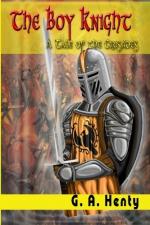In the ship which carried the Earl of Evesham’s contingent, order and discipline prevailed. The earl’s voice had been heard at the first puff of wind, shouting to the men to go below, save a few who might be of use to haul at ropes. His standard was lowered, the bright flags removed from the sides of the ship, the shields which were hanging over the bulwarks were hurriedly taken below, and when the gale smote them the ship was trim, and in readiness to receive it. A few square yards of sail alone were all that the captain had thought it prudent to keep spread, and in a minute from the time she was struck the lofty hulk was tearing along through the waters at a tremendous speed. Four of the best hands were placed at the helm; and here the captain took his post.
The danger was now that in the darkness they might run against one of their consorts. Even in the war of the elements they could hear from time to time crashes as of vessels striking against each other, with shouts and cries. Once or twice from the darkness ships emerged, close on one hand or the other; but the steadiness of the captain in each case saved the ship from collision.
As the storm continued these glimpses of other vessels became more and more rare, and the ship being a very fast sailer, the captain indulged the hope that he was now clear of the rest of the fleet.
He now attempted to lie-to to the storm, but the wind was too strong. The ships in those days, too, were so high out of the water, and offered in themselves such a target to the wind, that it was useless to adopt any other maneuver than to run before it.
For two days and nights the tempest raged.
“What think you,” the earl said to the captain, “of our position? Where are we, and where will the course upon which we are running take us?”
“I cannot say with certainty,” the captain said, “for the wind has shifted several times. I had hoped to gain the shelter of Rhodes, but a shift of wind bore us away from there, and I much fear that from the direction in which we have been running we must be very nigh on the coast of Africa.”
“Peste!” the earl said. “That would indeed be a speedy end to our Crusade. These Moors are pirates and cutthroats to a man; and even should we avoid the risk of being dashed to pieces, we should end our lives as slaves to one of these black infidels.”
Three hours later the captain’s prophecies turned out right. Breakers were seen in various points in front, and with the greatest difficulty the vessel was steered through an opening between them; but in another few minutes she struck heavily, one of her masts went over the side, and she lay fast and immovable. Fortunately, the outside bank of sand acted as a sort of breakwater; had she struck upon this the good ship would have gone to pieces instantly; but although the waves still struck her with considerable force, the captain had good hope that she would not break up. Darkness came on; the tempest seemed to lull. As there was no immediate danger, and all were exhausted by the tossing which they had received during the last forty-eight hours, the crew of the Rose slept soundly.




